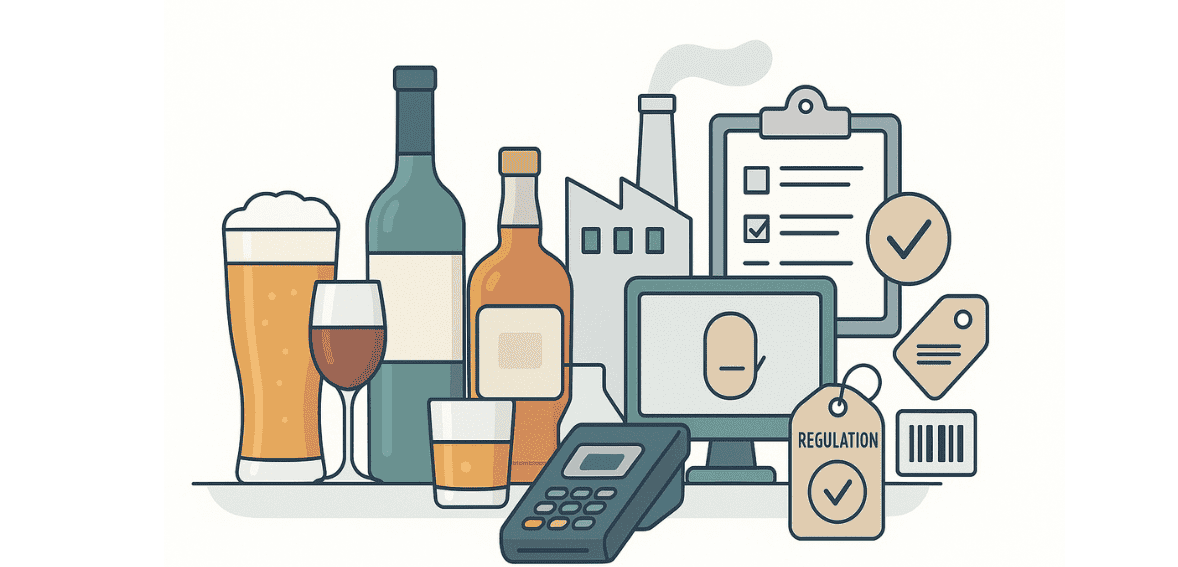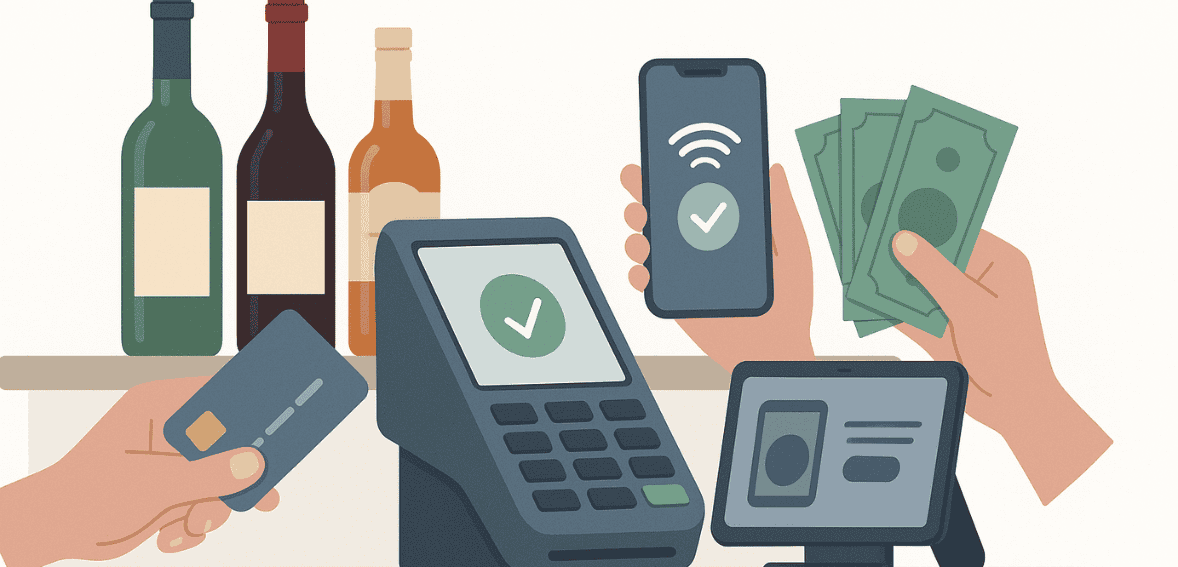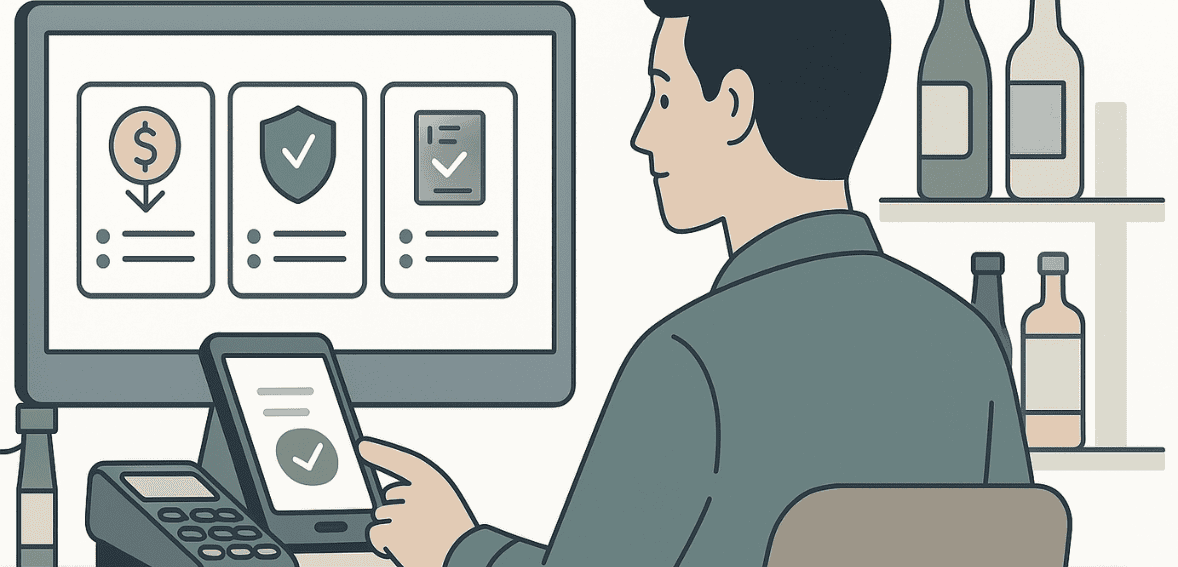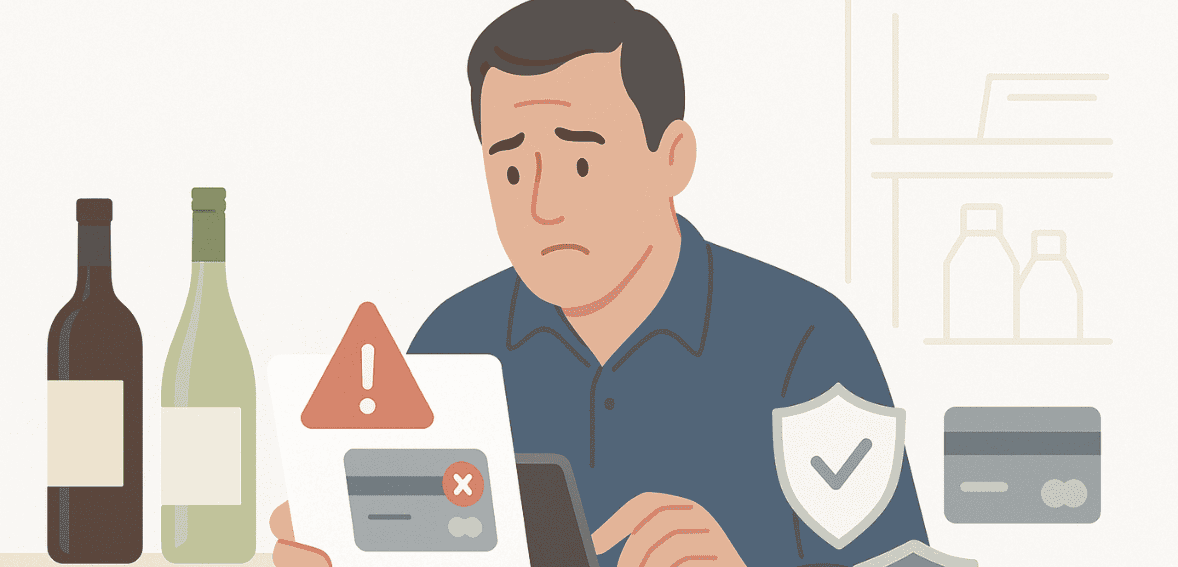The alcohol beverage business is thriving — be it a craft brewery, a boutique winery or an online liquor delivery service. But alcohol sales carry a unique set of obligations, particularly in payment processing. With the number of strict regulations tied to age verification and high chargebacks, alcohol businesses need to be especially careful about how they accept payments.
The decision over which payment system to use is about more than just convenience. It is about compliance, security, and scaling. A single mistake, such as the use of a non-compliant processor or failure to verify the age of users, could result in fines, shutdowns, or legal trouble. Whether you operate a tasting room or sell alcohol online, you should ensure that you have a proper alcohol beverage payment process. Here are the basics of alcohol beverage payments that you must be aware of.
Understanding the Alcohol Beverage Industry

Before getting into payments, it is important to understand how the alcohol beverage business is. This industry is highly regulated, high risk, and includes a variety of business types, each with disparate operational and payment challenges.
Key Players in the Industry
There are several modes in the alcohol marketplace:
- Breweries: Small-scale craft brewers to large commercial producers
- Distilleries: Makers of spirits like whiskey, vodka, and rum
- Wineries: Vineyards and wine producers, often with tasting rooms
- Distributors and Wholesalers: Bridge producers and retailers
- Retailers: Liquor stores, bars, restaurants, and online alcohol sellers
Each of them need to face different regulations on licensing, taxes, shipping and accepting payment.
Why It’s Considered High-Risk
Alcohol merchants are classified as high-risk businesses by most payment processors due to:
- Strict legal regulations
- Age restrictions on buyers
- Increased risk of chargeback and fraud
- Complicated shipping rules (particularly between the states)
As such, not every payment processor will be willing — or even allowed — to work with alcohol sellers.
Sales Channels in Alcohol Businesses
Alcohol is distributed through many routes, with differing models of payment:
- Store (off-premise), in-store (liquor stores, bars, taprooms)
- Internet (eCommerce wine clubs, delivery apps)
- Mobile/on-the-go (pop-ups, food trucks)
- Monthly alcohol box subscriptions
Each channel introduces risk and takes a regulatory perspective to payments.
Regulatory Compliance in Alcohol Sales

Alcohol sales are not a matter of swiping a card. It’s a rare case of one of the most regulated industries in the world. Federal to state, compliance is a key factor in your ability to process and accept payments.
Governing Bodies and Key Regulations
There are three levels of regulation for alcohol sales in the United States:
- Federal: The Alcohol and Tobacco Tax and Trade Bureau (TTB) oversees labeling, permits, and excise taxes.
- State: States control licensing, age limits, and in-state vs. out-of-state sales.
- Local: Cities or counties may have zoning or time restrictions on alcohol sales.
For a merchant to accept payments legally, the merchant must fall into all three tiers of regulation.
Age Verification Requirements
In the U.S., the drinking age is 21. So, the focus must also be on the integration of strong age verification mechanisms within any alcohol payment system. This can include:
- Verify date of birth at the point of sale
- ID scanning at POS terminals
- Third-party age verification for online purchases
Failure to do so may lead to heavy losses, loss of license or franchise, or closure of the business.
Online Sales and Delivery Restrictions
If you are selling alcohol online or via delivery services, your payment system will need to:
- Block transactions from geolocation-restricted areas
- Verify the delivery address complies with state law
- Fulfill orders only for confirmed, age-qualified purchasers
Some states prohibit direct-to-consumer alcohol shipments, making geo-blocking essential.
Interstate and International Regulations
When shipping alcohol across borders, things get even trickier:
- You may need a permit for every state you ship there
- For exports, an import/export license is required following foreign alcohol laws.
- There is also a need for payment systems to manage multi-currency and international tax requirements
Key Payment Methods in Alcohol Beverage Sales

Consumers demand fast, flexible, and secure methods of alcohol beverage payments. In order to compete, alcohol sellers will need to support a combination of traditional and modern payment methods.
Credit and Debit Cards
The traditional option, credit and debit card payments, are necessary for:
- In-store purchases at liquor stores, taprooms, and bars
- Online transactions for eCommerce alcohol brands
- Recurring orders like subscription-based wine clubs
Make sure your processor is PCI-DSS to safely handle cardholder data.
ACH Transfers and Direct Bank Payments
Used by distributors and wholesalers, ACH payments work best for:
- Bulk B2B alcohol orders
- Lower processing fees than cards
- Planned and recurrent operations
Some consumers may also use ACH for high-value specialty alcohol orders.
Mobile Wallets and NFC Payments
Apps like Apple Pay, Google Pay and Samsung Pay are surging, particularly with younger consumers. Benefits include:
- Faster checkout at bars and stores
- Reduced physical contact (important post-pandemic)
- Enhanced security through tokenization
Buy Now, Pay Later
While it’s relatively new territory for the alcohol world, BNPL are growing popular for:
- Gifting alcohol online
- Spreading out large purchases (e.g., premium whiskey, wedding packages)
- Attracting impulse buyers who prefer flexibility
BNPL also needs to comply with age verification and alcohol-specific rules.
Select the Perfect Payment Processor for Alcohol Beverage Payments

Not all payment processors are created to accommodate alcohol sales. With the legal complexities and high-level risk classification, you require a provider that focuses on or accommodates alcohol related transactions. Choose the wrong processor, and it could freeze your funds — or close your account outright.
Check Out “Alcohol-Friendly” Processors
Select a payment processor that:
- Knowledge of alcohol controls
- Accepts high-risk industries
- Card-present and e-commerce capable
- Experience working on age-restricted products
Examples include processors that do business with wineries, breweries or liquor delivery apps.
Must-Have Features in a Payment Processor
Be sure your processor will include these essentials:
- PCI-DSS Compliance: Ensures card data is encrypted and stored securely.
- Chargeback Management: Tools to detect, dispute, and reduce chargebacks.
- Fraud Prevention: Includes AVS, CVV, 3D Secure, and IP tracking.
- Age Verification Integration: Especially important for online sales.
- Multi-Channel Support: Syncs payments across in-store and online platforms.
Clear Pricing and Fee Schedule
A lot of alcohol merchants are paying a higher rate. Look for:
- No hidden fees or rolling reserves
- Competitive interchange-plus pricing
- Low or waived monthly minimums
Before you sign, make sure to ask about refunds, settlement times, and contract terms.
Excellent Customer Service and Experience
You’ll want a processor that:
- Gives prompt response to problems or flagged transactions
- Assists with compliance audits or regulatory changes
- Knows the unique requirements of alcohol eCommerce/ events/ retail.
A provider that can’t answer questions about licensing or shipping laws is not the right provider.
Online vs. In-Store Sales and Payment Processing
Alcohol merchants frequently operate over multiple channels — tasting rooms, retail shops, websites, and even delivery apps. Every environment requires a different set of tools and compliance tactics to process payments in a secure, compliant manner.
In-Store Payment Needs
Physical locations such as liquor stores, bars, or taprooms usually run on:
- POS (Point of Sale) Systems with EMV Chip readers and Contactless capabilities
- Age Verification at Checkout (eg, ID scanning, age input manually)
- Point of Sale (POS) integration for hybrid solutions
For in-store payments, speed and simplicity count — but so does adherence to regulation.
Online Payment Requirements
For ecommerce alcohol sales, a strong digital payment gateway is necessary and it needs to include:
- Age Verification Plugins
- Shipping Restrictions by State or Country
- Advanced fraud protection
- Secure your transactions with SSL Encryption and PCI Compliance
You’ll also require a shopping cart that will perform real-time order verification and tax calculations.
Delivery and Mobile Payments
If you deliver (either directly or through other apps), you’ll want to make sure that:
- Payment terminals used by drivers are secure and mobile-enabled
- Digital receipts and signatures are stored properly
- Contactless payment options are available for convenience and hygiene
- Delivery personnel verify age at the door before handing over orders
Subscription or Membership Models
If your business uses recurring billing (e.g., wine-of-the-month clubs), look for:
- Automated billing systems with stored customer data
- Easy opt-in/out options for compliance
- Recurring payment authorization and reminders
These models offer convenience but require extra care in age validation and data protection.
Managing Chargebacks and Fraud in Alcohol Sales

The chargeback risk for alcohol businesses is higher than for most other industries. Deceptive orders, underage customers and disputes about delivery and product quality all can result in costly chargebacks. If you don’t handle them right, they can seriously damage your reputation—and get your merchant account closed.
1. Why Chargebacks Are Common in Alcohol Sales
Several factors contribute to frequent disputes:
- Underage transactions or unauthorized card use
- Failed deliveries or orders returned due to shipping restrictions
- Subscription disputes (auto-renewals not recognized by the buyer)
- High-ticket orders of premium alcohol attracting fraudsters
2. Strategies to Prevent Chargebacks
To protect your business, implement the following:
- Clear product descriptions and return policies
- Use delivery confirmation and tracking for all shipments
- Employ 3D Secure authentication and AVS (Address Verification System)
- Match billing and shipping addresses when possible
- Provide prompt customer service to resolve complaints quickly
For in-person sales, always check and log customer ID verification.
3. Fraud Detection Tools
Modern fraud detection systems use AI and analytics to catch risky transactions. Look for tools that offer:
- Velocity checks (flags repeat purchases in short periods)
- Geolocation filters (blocks mismatched IP and billing data)
- Device fingerprinting (identifies high-risk devices)
- Blacklist/whitelist capabilities for trusted or risky buyers
These tools lower your fraud risk without adding friction to the buyer experience.
4. Responding to a Chargeback
If a chargeback does happen:
- Gather evidence (delivery receipts, ID verification, communication logs)
- Submit a strong rebuttal to your payment processor quickly
- Avoid recurring disputes by fixing the root issue (e.g., misleading charges or shipping delays)
A solid win ratio can protect your account even if occasional chargebacks occur.
Trends and Innovations in Alcohol Beverage Payments
As customer expectations evolve, so does the technology supporting alcohol sales. Businesses that stay ahead of payment trends can offer better service, remain compliant, and gain a competitive edge.
1. Contactless and Mobile Payments Are Booming
Since the pandemic, buyers have shifted toward:
- Tap-to-pay credit cards
- Mobile wallets like Apple Pay and Google Pay
- QR-code-based payments in bars and tasting rooms
These options provide faster, cleaner transactions, especially in crowded or on-the-go environments.
2. Embedded Payments in Delivery Apps
Apps now integrate seamless in-app payments, making alcohol delivery fast and frictionless. Key features include:
- Saved payment info for repeat orders
- Real-time order tracking and notifications
- Integrated age verification before final payment
Expect even more alcohol brands to build native mobile apps with embedded checkout experiences.
3. Loyalty and Rewards Integration
Payment systems now double as customer loyalty tools, tracking:
- Purchase frequency
- Favorite brands
- Total spend
This data helps merchants personalize offers and launch rewards programs linked directly to payment history.
4. AI-Driven Fraud Detection
AI-powered fraud systems can detect and block suspicious orders in real time using:
- Machine learning patterns
- Transaction history
- IP/device anomalies
This allows for fewer false declines and better security—essential in the high-risk alcohol space.
Conclusion
The alcohol beverage industry poses unique needs for payment-processing solutions. Between compliance and secure payment processing, it’s important alcohol sellers remain ahead of the game. Selecting the best payment processor, handling chargebacks, and adopting the latest technology, you can position your business be successful in a very competitive and high-risk industry.
Whether you own a tasting room, an eCommerce store, or an online delivery service, the right payment mechanism will facilitate smooth transactions, reduce legal liability, and ultimately provide your customers with a great experience.
FAQs
1. Can I accept credit card payments for alcohol sales online?
Yes, you can, but your payment processor must be alcohol-friendly and comply with age verification laws. You also need to ensure that shipping complies with state regulations.
2. How do I verify age when selling alcohol online?
Age verification can be integrated directly into your payment gateway or via third-party services that check customer IDs or birthdates during checkout.
3. Why are alcohol merchants considered high-risk by payment processors?
Payment processors categorize alcohol merchants as high-risk due to the potential for chargebacks, fraud, and strict regulatory requirements. Additionally, chargebacks are more common in alcohol sales due to underage purchases or delivery issues.
4. Are mobile wallets like Apple Pay safe for alcohol transactions?
Yes, mobile wallets like Apple Pay are secure. They use tokenization to protect payment information and are contactless, making them ideal for fast, safe in-person transactions.
5. What’s the best payment processor for alcohol businesses?
The best processor depends on your specific needs, but look for one that supports high-risk industries, integrates age verification, and offers chargeback management features. Companies like Square (with alcohol-specific policies) are good options for many alcohol businesses.
